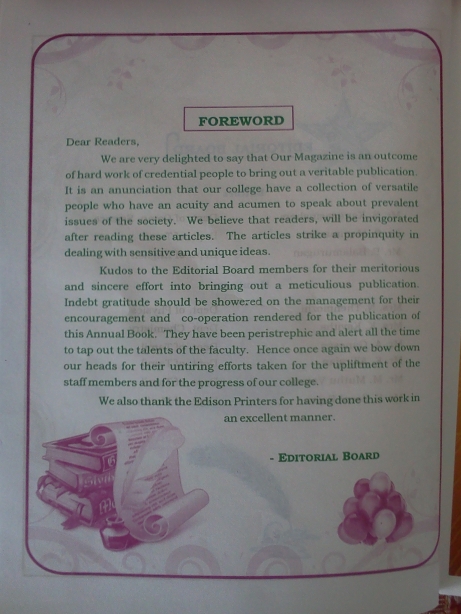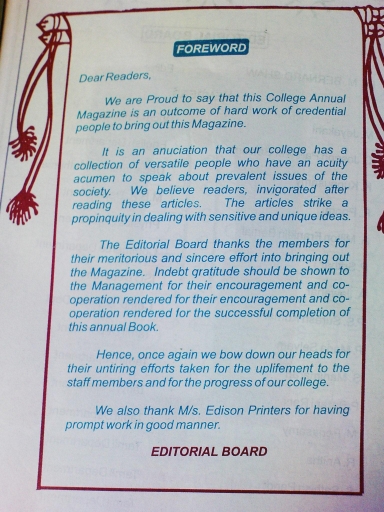- HOME
- ENGLISH FORUM
- USE AND MISUSE
- BADLY WRITTEN, BADLY SPOKEN
- GETTING
TO KNOW ENGLISH - PREPARING FOR ENGLISH PROFICIENCY TESTS
- GOING DEEPER INTO ENGLISH
- YOU ASKED ME THIS QUESTION
- ADVOCACIES
- EDUCATION AND TEACHING FORUM
- ADVICE AND DISSENT
- MY MEDIA ENGLISH WATCH
- STUDENTS' SOUNDING BOARD
- LANGUAGE HUMOR AT ITS FINEST
- THE LOUNGE
- NOTABLE WORKS BY OUR VERY OWN
- ESSAYS BY JOSE CARILLO
- Long Noun Forms Make Sentences Exasperatingly Difficult To Grasp
- Good Conversationalists Phrase Their Tag Questions With Finesse
- The Pronoun “None” Can Mean Either “Not One” Or “Not Any”
- A Rather Curious State Of Affairs In The Grammar Of “Do”-Questions
- Why I Consistently Use The Serial Comma
- Misuse Of “Lie” And “Lay” Punctures Many Writers’ Command Of English
- ABOUT JOSE CARILLO
- READINGS ABOUT LANGUAGE
- TIME OUT FROM ENGLISH GRAMMAR
- NEWS AND COMMENTARY
- BOOKSHOP
- ARCHIVES
Click here to recommend us!
BADLY WRITTEN, BADLY SPOKEN
This page seeks to promote good English usage in everyday life—whether at home, at school, in the workplace, in public platforms, in the mass media, in books, and anywhere else where the printed or spoken word is used. In short, this page will serve as some sort of grammar police against blatant or grievous public misuses of English.
So, whenever you encounter such misuse, share it through this page in the spirit of constructive criticism. Our ultimate goal, of course, is to bring the misuse to the attention of those responsible so they can make the necessary correction.
After 3 years, the English of a college organ in India remains awful
Here’s clear, incontrovertible proof that whether individually or institutionally, achieving proficiency in English simply doesn’t happen overnight but takes years of continuing study, rigorous application, and sustained practice.
A little over three years ago, on August 8, 2010, Prof. R. Muthukumar, a business administration professor of NMSSVN College in Nagamalai, Madurai, India, sent to the Forum the following scanned image of the foreword page of the college magazine:
THEN (circa 2010):

Last August 8, 2013, Prof. Muthukumar sent to the Forum the scanned image of the foreword page of the 2013 issue of that same magazine, shown below, with the following note: “With an indomitable spirit my college Editorial Board has done it again—in this year’s Magazine!”
NOW (circa 2013):

Comments about the English of the foreword above will be most welcome.
Click here to see all postings in this section
Previous Feature:
The problem with the chosen test answer is its faulty syntax
Question by Miss Mae, Forum member (June 19, 2013):
Could you please explain why C is the correct answer?
American artist Grant Wood is famous for iconic images such as paintings as
A B C
“American,” which became one of the most parodied artworks within American popular culture.
D
My answer: D
Correct answer: C
Note: The sentence was from TOEFL Structure and Written Expression Test #1.
My reply to Miss Mae:
Your question is about Test Item #78 of TOEFL Structure and Written Expression Test #1. It belongs to the tests under Part B. Written Expression. The directions for these tests are as follows:
In these tests, each sentence has four underlined words or phrases. The four underlined parts of the sentence are marked A, B, C and D. Identify the one underlined word or phrase that must be changed in order for the sentence to be correct. Then, on your answer sheet, find the number of the question and fill in the space that corresponds to the letter of the answer you have chosen.
Now, Test Item #78 is as follows:
78. American artist Grant Wood is famous for iconic images such as paintings as
A B C
“American,” which became one of the most parodied artworks within American popular
D
culture.
Answer: (A) (B) (C) (D)
The correct answer choice for this test is the underlined word or phrase that must be changed in order to be correct; in other words, it is the grammatically wrong part of the sentence. By inspection, we will find that there’s nothing grammatically wrong with how each of these grammatical elements are used in the sentence: (A) “American,” (B) “famous,” and (D) “within.” In the case of (C) “such as,” however, there’s something wrong with the syntax of the expression formed by using it: “…famous for iconic images such as paintings as ‘American’.” Specifically, the form “such as paintings as” is grammatically faulty and awkward. For the whole sentence to express its idea correctly, that form needs to be grammatically corrected as follows: “…famous for iconic images in such paintings as ‘American’.” Answer Choice (C) “such as,” which is grammatically faulty, is therefore the correct answer.
It’s possible that you got confused in answering that particular test question because the explicit directions for both Part B. Written Expression and Part A. Structure were inadvertently not provided for this particular set of TOEFL practice tests. We are sorry for this oversight, and we have now provided those explicit directions for the benefit of those who’d be likewise taking these practice tests.
Thank you for your question and for the opportunity it has given us to find out that the directions to those two parts of the test have been overlooked.
Click here to see all postings in this section
Watch out for subject-verb agreement in incomplete sentence tests
Question by Miss Mae, Forum member (June 17, 2013):
Could you please explain why the dependent clause in the sentence below requires the past form of continue?
As strong winds and torrential rains __________ to threaten lives on the Vietnam mainland, the government advised the residents to evacuate immediately.
(A) continued
(B) continuing
(C) continuously
(D) continues
My answer: D
Correct answer: A
Note: The sentence was from TOEIC Practice Test #1 - Incomplete Sentences
My reply to Miss Mae:
Based on its construction, the sentence in question needs a verb to make sense. Answer Choice “(B) continuing” couldn’t be the correct answer because the progressive form of the verb is grammatically faulty here. Answer Choice “(C) continuously” is an adverb and doesn’t fit into the sentence construction. This leaves only Answer Choice “(A) continued” and Answer Choice “(D) continues” as the only possible answers.
On inspection, we find that the subject of the dependent clause is the compound subject “strong winds and torrential rains.” This subject is plural, so Answer Choice “(D) continues” will result in a subject-verb disagreement; of course, it could have been a correct answer if it were in the present-tense plural form “continue.” This being the case, Answer Choice “(A) continued,” with the verb in the past tense, is the only possible correct answer. Recall that in English grammar, the past tense form of the verb is the same regardless of whether the subject is singular or plural.
Rejoinder from Miss Mae (June 18, 2013):
So if the answer listed in D is “continue,” it would be right?
My reply to Miss Mae:
Yes, absolutely. In English-testing parlance, such an answer choice is called a distractor—ananswer that can be correct in an altered context. It is meant to test grammatical proficiency and sensitivity to the nuances of the language.
Click here to see all postings in this section
Proposed rewrite of inscrutable English of magazine’s foreword
New Forum member Menie made the following posting that offers a suggested rewrite of the seriously flawed English of a college magazine’s foreword that was sent to me last August 8, 2010 by Prof. R. Muthukumar of the Department of Business Administration of NMSSVN College in Nagamalai, Madurai, India:

I see that no one has taken up the challenge of translating this to something which can be understood at first reading, so I will give it a try. Step one is a literal translation: substituting the weird words and phrases with understandable words or phrases, but retaining the general style of the sentences.
Dear Readers,
We are proud to say that this College Annual Magazine is a product of the hard work of qualified people.
It is an announcement that our college has a collection of versatile people who have clear ideas about prevalent issues in society. We believe that our readers will be invigorated after reading these articles, which deal closely with sensitive and unique ideas.
The Editorial Board thanks the members for their meritorious and sincere effort in bringing this Magazine out. We also thank Management for their encouragement and cooperation toward the successful completion of this annual book.
Once again we bow our heads in recognition of Management’s untiring effort to uplift the condition of the college staff and to continue the progress of our college.
We also thank M/s Edison Printers for their good and prompt service.
Having understood what they are trying to say, we can then attempt to rewrite it in a better style, but still retaining all of the ideas expressed above.
Dear Readers,
We are proud to present to you this College Annual Magazine.
This is a collection of views on prevalent issues in our society, which are examined with sensitive and unique perspectives. We hope that you will find these articles interesting and that these will move you to take further action.
We wish to thank the contributors and magazine staff for their hard work and dedication.
We also thank the school administration for their encouragement and support toward the successful completion of this magazine. We take this opportunity to acknowledge their untiring effort toward the betterment of the college staff and the continuing progress of our school.
Lastly, we thank M/s Edison Printers for their excellent work.
“Sick books” issue goes off the deep end, then bubbles up again
There was this story in two of the broadsheets last November 9 that Education Secretary Armin Luistro visited “sick books” crusader Antonio Calipjo Go recently and encouraged him to resume his terminated crusade. This was after Mr. Go announced a few days back that he was shelving his one-man advocacy for good, having been intensely pilloried instead of being thanked for it by the publishers, authors, and editors of the targeted textbooks.
Well, what a coincidence! Just two days before that, a new member of Jose Carillo’s English Forum—his username is pedestrian—asked me to explain what those textbook errors were all about in the first place. He was belatedly responding to a June 6, 2009 editorial of The Manila Times that commented on the several dozens of questionable English passages that Mr. Go had found in six locally produced English-language textbooks. Pedestrian was saying that since there was no explanation for those errors, it’s difficult for him to learn from them.
I told pedestrian that then and now, I just didn’t have the time to critique all those problematic textbook passages, but I consented to doing the following four samplers just to give him some idea of what the problem is all about:
(1) “The rain and storm are needed to snuff out the heat in the air.” There’s nothing wrong with the grammar of that sentence, but its sophomoric use of the phrasal verb “snuff out” makes it sound infantile. To “snuff out” is much too strong and emotional a verb phrase in that statement, for it means “to extinguish (as in smothering the flame of a candle), make extinct, kill, or execute.” And to say that the rain and storm are “needed” to do that snuffing out action on heat is unwarranted personification, or inappropriately representing rain and storm as humans. Here’s a more objective, level-headed way of wording that sentence: “The rain and storm remove heat from the air.”
(2) “Just remember this acronym—DOCSiShQACNMN to make it easy for you to remember the order of adjectives in a series.” It should be obvious even to a preschooler that this is ridiculous advice—to use a tangled, tongue-twisting, terribly-hard-to-recall acronym as a mnemonic for remembering the order of adjectives in a series. We normally expect to get such advice from simpletons, not educators or textbook writers.
(3) “Robert Louis Stevenson wrote the novels ‘The Treasure Island’ and ‘The Kidnapper.’” This factually erroneous sentence is the result not only of the ignorance and laziness of the textbook writer but also the carelessness and cluelessness of the textbook editors. The correct titles of those very popular novels are Treasure Island—without the article “The”—and Kidnapped—not “The Kidnapper.” It’s really unthinkable for the author of that book not to know this, and this kind of factual error makes that textbook statement sound almost like a sick joke.
(4) “My sister is old. She can accompany me to the outing.” This statement is semantically faulty and almost laughable. It gives the idea that old age is a prerequisite for someone to qualify as a companion to an outing. This time, the problem is both semantic and grammatical. What the writer obviously wanted to say is, “My sister is old enough. She can accompany me to the outing.” The adjective “enough” would have been enough to make that statement logical, but the textbook writer evidently didn’t have enough semantic sensitivity to make that distinction.
I told pedestrian in closing that I wish someone would pick up after me and find time to dissect the remaining problematic textbook passages, which I daresay won’t be remedied by simply providing supplemental notes to the flawed textbooks, as had been done by the DepEd. Those textbooks should be withdrawn from circulation as soon as practicable, then replaced with textbooks written by semantically competent authors.
Read The Manila Times editorial on the textbooks with erroneous English!
Read “Luistro backs Go crusade” in the Philippine Daily Inquirer now!
And we thought we’d find typos only in newspapers and books!

I don’t think we can blame this one on the influence of too much short-cut texting on the mobile phone.
What do you think?
Here’s the story from Yahoo!
Cringe-inducing typo outside N.C. school
By Brett Michael Dykes
Well, here's something to make your old English teacher gasp in horror: A road contractor hired to paint the word “school” on a freshly paved stretch of road near Southern Guilford High School in North Carolina rendered the traffic area in question a “school” zone.
But fear not for the (surely confused) youth of Greensboro! The contractor, a company called Traffic Markings, has already corrected the error. Here's visual evidence, courtesy of local TV station WXII.
WXII had some fun with the typo on the air too:
This isn’t the first such mishap on record. Last year, for instance, a Miami-area road crew offered the variant spelling of “scohol,” while in 2007, a team in Kalamazoo, Mich., managed the same “h” and “c” reversal.
Chalk it all up to a bad day’s wrok.
Reporting English misuse:
You can report the English misuse by e-mailing a verbatim transcription or an image in GIF or JPEG format to jcarilloforum@gmail.com. When doing so, please be mindful of the laws against libel and oral defamation. Our interest is not to humiliate English-language offenders but to help them rectify the error, so there’s no need to identify them in your messages. Just indicate the city, district, street, and general location where you saw or found the particular English misuse to make it easier for those concerned to be alerted about it.
We will also need your full name, residence, e-mail address, and telephone number so we can confirm with you before the posting is made on this page. Just let us know if you don’t want to be identified in the posting so we can withhold your identity. Please keep in mind that this page will be moderated and will not entertain scurrilous reports nor those sent in by anonymous sources.
That said, you can now get started in doing volunteer police work for the sake of good English! It should be a truly gratifying educational experience and you and other English lovers can have lots of fun besides!






